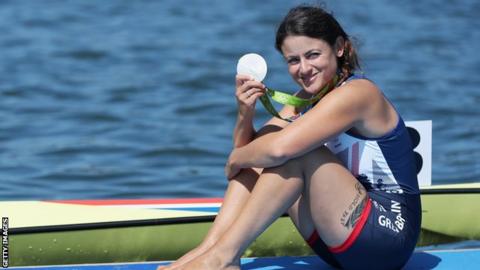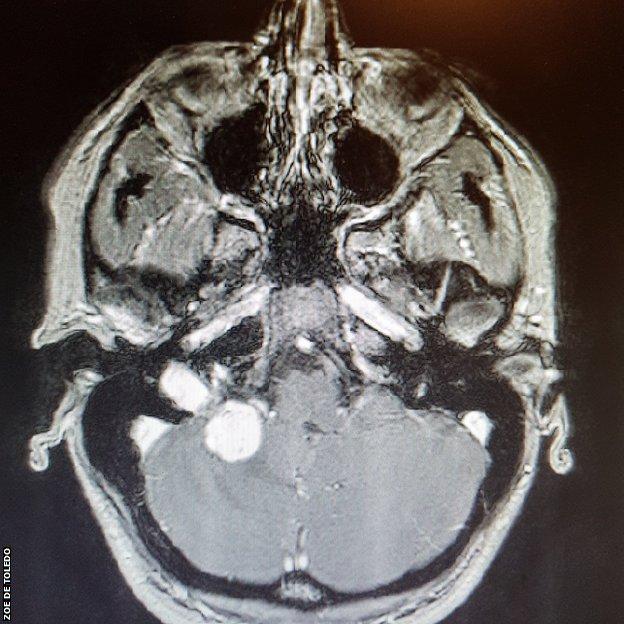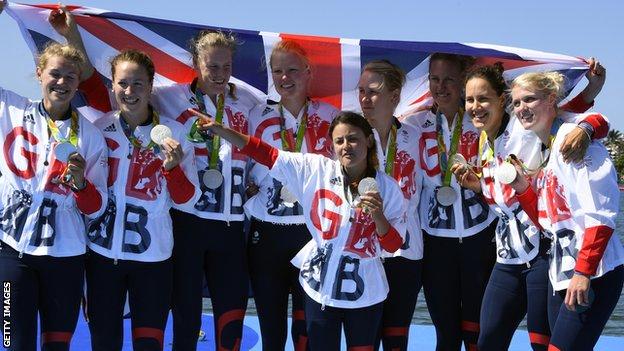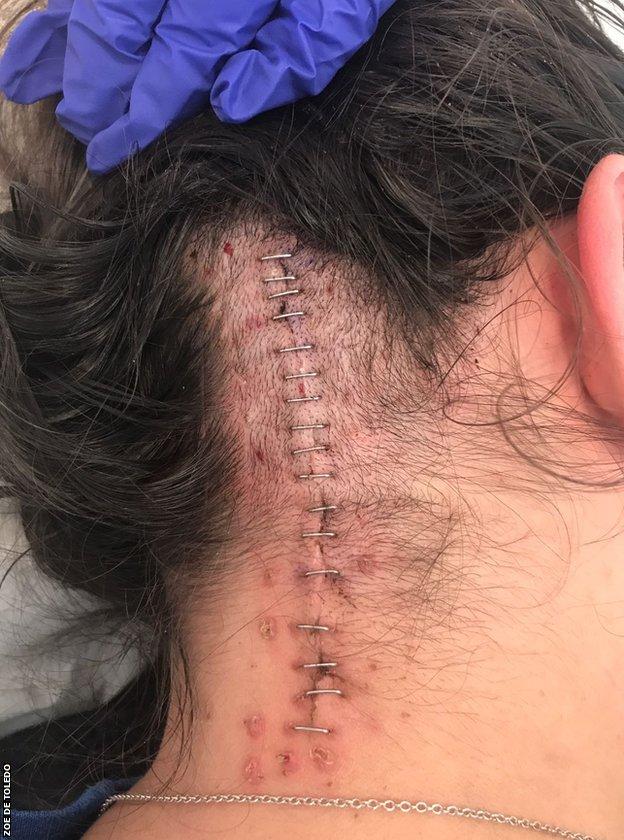Zoe de Toledo: Olympic silver medallist and her brain tumour called 'Steve'

'Steve' was with Zoe de Toledo when she won an Olympic rowing medal at Rio 2016.
He was with her on the podium alongside Britain's women's eight, who she had just coxed to a historic silver.
And he was still there when, 16 months later - after retiring from rowing, she signed up for a research project to earn a quick £60.
But it was only later that December day that De Toledo, a medical student, first became aware of his existence - thanks to an MRI scan done to make some extra cash.
'Steve' was a brain tumour.
De Toledo gave it a name to lessen the mental impact and - thankfully benign - 'Steve' was removed in early March this year.
Just four months later, De Toledo will form part of a team rowing 900km in Zambia for charity.
Not that she has mentioned that to her doctors yet...
'I was really relaxed' - the discovery
Sixteen months on from her memorable moment in Rio, life was very different for De Toledo.
Having retired from international rowing after the Olympics, she was concentrating on her studies at Oxford University's medical school with a view to becoming a doctor.
But, when she failed an end-of-year exam, her life took another change of direction.
"I was given the chance to re-sit the exams, but all my student funding got taken away," the 30-year-old told BBC Sport.
"As one of my money-making schemes I decided to be a research participant. In one project, I effectively had to breathe some air and then go in an MRI scanner."
With a bit of cash in her pocket, De Toledo went home.
But that night, in mid-December, she received a call from the hospital. An "incidental" had been found on her scans, and more tests were needed.
"I was really relaxed about it, because I know they find incidentals a lot. Stick anyone in for a full body scan and you'll probably find something wrong with them," she said.
"I realised quite quickly that it was a lot more serious than first thought and could have a much bigger effect on me.
"If I'd waited to have it removed, it would have got bigger and there could have been more serious problems."
'Minding its own business' - the tumour
De Toledo coxed the Oxford eight in the Boat Race in 2012 - the year a protestor jumped into the water and swam in front of the crews.
She won European bronze the same year, before adding silver in 2014. But 2016 was her crowning year, winning European gold before capping her rowing career with Olympic silver.
All the while, she was oblivious to what was going on in her head.
"Being told I had a brain tumour was one of those things that I just took in my stride," she said.
"I gave it the name 'Steve' because I didn't want to keep referring to 'my tumour' - it made it sound a lot worse than I felt like it was.
"I took it all in and just got on with things, but it got harder when we started talking about whether to operate or whether to leave it for a bit longer.
"It had probably been there 10 or 15 years, the doctors don't know for definite but that's what they assume. It's odd to think it was just sitting there the whole time, minding its own business."

'It could have been too late' - brain surgery
On Friday, 2 March, De Toledo was taken into surgery for a procedure that was supposed to take, at most, four hours.
Almost 13 hours later, in the early hours of Saturday morning, she was wheeled out of theatre, after surgeons discovered 'Steve' was much more advanced than first thought.
"These tumours are usually fed by a couple of blood vessels, whereas mine had a huge blood supply," she said.
"They said there was a lot more swelling in the brain than they originally thought, which means the symptoms could have been coming a lot sooner.
"If I hadn't had that scan and they hadn't found the tumour, it could soon have been too late to operate. I've been unbelievably lucky.
"You can't see a positive when you fail an exam, but clearly this has been one."
'I watched TV for 12 hours a day' - the recovery
The surgeons had to leave a small part of De Toledo's tumour behind, because it was too close to her brain stem.
She was discharged two days after the operation finished and had a headache for the next fortnight.
She still gets tired while walking around her flat, and talking on the phone leaves her short of breath.
"The first few weeks after my operation weren't nice," she said. "I got quite dizzy moving around and I couldn't read for ages because one of my eyes would flicker and that made me feel quite nauseous.
"I just sat and watched TV for 12 hours a day, which was quite mind-numbing. Doing nothing was quite fun for the first few days when I was being lazy, but then it just got frustrating.
"Now, I'm back to my revision for my exams in June but I do find I get very tired. And I've got this big old scar on the back of my head."

'I'm the least athletic Olympian' - the expedition
De Toledo's biggest problem now is swapping a 'cox box' for an oar.
Coxes don't row. The ninth person in an eight-strong boat, they are the eyes and ears of the crew, steering and co-ordinating the power and rhythm of the rowers.
But De Toledo will change seats in July as she, her partner Alex, and - funding dependent - between 12 and 14 crew-mates tackle 900km of the Kafue River in Zambia.
"It's to raise funds and awareness for clean water activities," she said. "We're looking at clean water for now and the future, as well as supporting a project to bring more rowing to Zambia.
"We rowers use the water all the time and take it for granted. And elite sport is such a selfish activity - you don't go to the Olympics to help the world, you do it for yourself.
"The horror of the expedition is that I'm actually going to be rowing. I'm not a fit person. I'm the least athletic Olympian you'll ever meet. So the big challenge for me is making sure I've done enough rowing to be a useful member of the team.
"I don't think I've actually told the doctors that I'm doing it. They'll find out soon enough. My other half is a trauma and orthopaedic surgeon and if he thought it was a terrible idea, he would tell me. I just have to be sensible.
"The tumour is just another thing I have overcome, another thing I have conquered and something that will make me a stronger person."
Source : http://www.bbc.com/sport/rowing/43605200


No comments